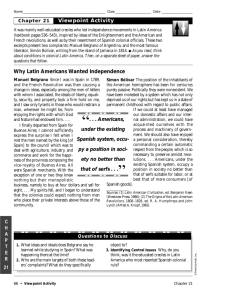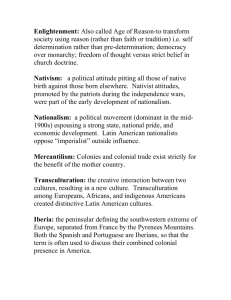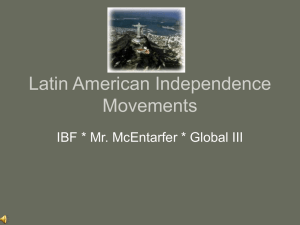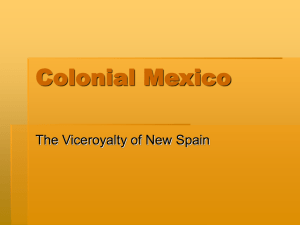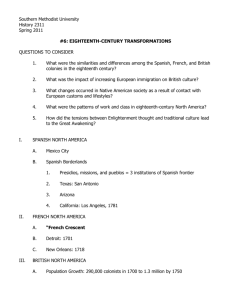Class Notes: Background to Latin American Independence
advertisement
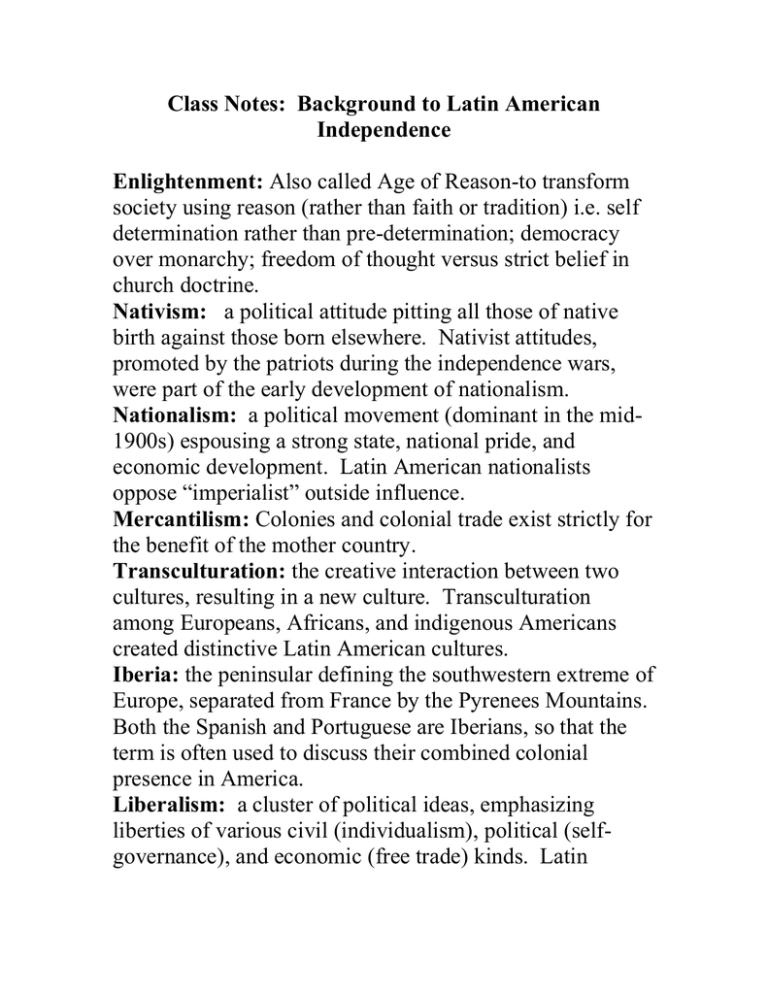
Class Notes: Background to Latin American Independence Enlightenment: Also called Age of Reason-to transform society using reason (rather than faith or tradition) i.e. self determination rather than pre-determination; democracy over monarchy; freedom of thought versus strict belief in church doctrine. Nativism: a political attitude pitting all those of native birth against those born elsewhere. Nativist attitudes, promoted by the patriots during the independence wars, were part of the early development of nationalism. Nationalism: a political movement (dominant in the mid1900s) espousing a strong state, national pride, and economic development. Latin American nationalists oppose “imperialist” outside influence. Mercantilism: Colonies and colonial trade exist strictly for the benefit of the mother country. Transculturation: the creative interaction between two cultures, resulting in a new culture. Transculturation among Europeans, Africans, and indigenous Americans created distinctive Latin American cultures. Iberia: the peninsular defining the southwestern extreme of Europe, separated from France by the Pyrenees Mountains. Both the Spanish and Portuguese are Iberians, so that the term is often used to discuss their combined colonial presence in America. Liberalism: a cluster of political ideas, emphasizing liberties of various civil (individualism), political (selfgovernance), and economic (free trade) kinds. Latin American liberalism focused on European and, later, US models. Peninsulares- Whites born in Spain Renios-Whites born in Portugal Creoles- Whites born in Spanish America Mazambos- Whites born in Brazil Spanish colonial empire endured for over three centuries. What were the causes of its demise? Economic; New Laws of the Indies(1542)- tried to do away with encomiendas, outlawed native slavery, establishes repartmiento and mita. Colonial reaction-‘obedezco pero no cumplo’ I accept your authority, but will not comply. Colonial trade- Casa de Contraccion held a monopoly on all trade with the colonies. Only Seville and Cadiz in Spain and Veracruz and Portobelo in the Americas could send and receive goods. Usually only one fleet per year. Colonists smuggled and set up black market with Dutch, English and French.(especially Buenos Aires and Caracas) Spain-Losing the Race of Industrialization Colonial industries established in areas such as textiles, glasswares, shoes, tiles and furniture. Crown tries to fight “unnecessary diversification” of the colonial economy. Most elites are landowners, as in Spain, look down on merchants, craftsmen and anything they see as dishonorable professions. Entrepreneurs take back seat to tradition. Society: Patriarchal- male dominated at all levels-especially in interior ‘el patron’ (caudillo) is center of all activity on haciendas, ranches and plantations. Legal caste system in place- recorded by the church Low castes could not be priests, attend university, wear silk, own weapons… Rules against reproducing between classes- of course it happened and the castes get blurred. Transculturation- the “Americano” is being born! To raise money the Crown sells ‘legal whiteness’ Rivalry between Peninsulares( in Brazil-Renois) and Creoles(in Brazil-Mazambos) Pens. Got most of the high government and church posts, make money then return to Spain was the goal Creoles wanted higher authority, felt slighted Owned a large % of land Birth of nativism and eventually nationalism! Religion: Rooted in Roman Catholic faith and structurereinforced traditional, patriarchal and hierarchical society To be Spanish, or Portugese, was to be Catholic 1757- Problems between colonial elite and Jesuits over mission lands and natives, mixed with Crown’s questions over Jesuit wealth, power and most of all loyalty to Spain, led to the expulsion of Jesuits and the destruction of their missions. Politics: Crown officials-viceroys, archbishops, Council of the Indies, Intendant (judges), Casa de Contraccion (taxes, trade) Heavy systematic bureaucracy- tradition was the way Colonial officials- dominated by Creoles -Cabildos local authorities- relative autonomy Local court judgeships could be bought Militia officer posts go to Creoles-(fuero militar) Bourbon reforms- had the goal of making Spain more competitive with other European powers, by developing industry, improving agriculture and building a middle class. Decree of Free Trade 1778- all ports in Latin America and Spain are open to trade with one another, but not other countries! Had initial success but was doomed to fail for three reasons 1. left out the Creole majority 2. Spain’s industrial weakness 3. Spain’s inability to keep up trade with the colonies Napolean’s invasion and conquest of the Iberian Peninsular Further drives a wedge between Spain and the Creoles. A central Junta is established in Cadiz- not recognized by the colonials who set up their own juntas to rule in the name of Ferdinand.
